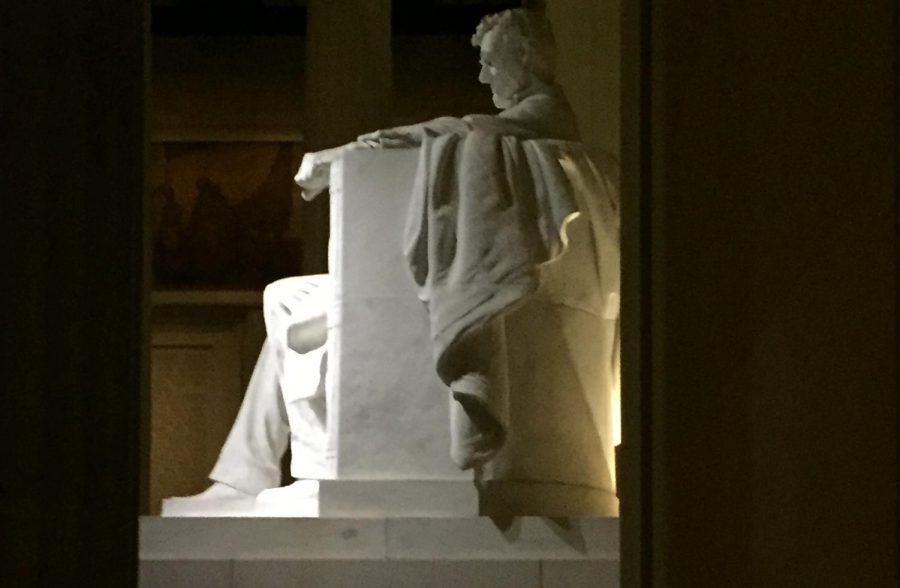Colley: There is No Political Pluralism
The Lincoln Memorial is supposed to stand as a monument to America’s triumph over racism – but has America really moved on?
September 16, 2018
Politics has always seemed quite intense to most people. It’s so apparently intense that about half of the eligible electorate never turns up to vote. This makes one wonder why it is. There clearly isn’t a shortage of critical issues, such as climate change, gun control, or race relations. What can be made from this situation?
It is clear that events in recent US history have left the general population less confident in government institutions; this was, after all, one of the justifications for the Economist Intelligence Unit’s downgrading of the US from a “Full Democracy” to a “Flawed Democracy.” This downgrading was done in 2016 during the aftermath of the Presidential Election, a key event which saw a large increase in divisiveness and distrust of the government after accusations of corruption, collusion with foreign powers to influence the election and fraudulent victories in primaries.
However, one must ask if this recently-developed polarity is justified. The answer might seem obvious to a liberal or conservative. Liberalism and conservatism, the Democratic and Republican Parties, are the exact opposites, right? This isn’t necessarily the case.
It is clear the social positions and platforms of the two main parties in the US are distinct from another, typically in responses to one another. An example of this being the opportunistic adopting of support of the legalization of gay marriage by the Democrats in the early portion of the 2010’s and the Republicans’ response of opposition to it. However, a more specific and interesting example is that of the legalization of marijuana. This materializes in the form of Democrats generally supporting the motion outright but also in Republicans supporting it in areas where it is electorally beneficial. A similar situation also occurs within the Democratic Party with its minor conservative faction.
The distinctions between Republican and Democratic economic policy, on the other hand, become more blurred. Both the Republican and Democratic Parties are staunch supporters of neoliberal economic policy, even the so-called “socialists” among the Democrats. The Republicans across the board proclaim their support for free-market capitalism, generally encouraging free trade proposals such as the North American Free Trade Agreement and the Trans-Pacific Partnership. However, the same is true for most Democrats and their establishment, although some stepping away from the Trans-Pacific Partnership after Social Democratic politician Senator Bernie Sanders’ criticisms of it achieved brief popularity. The Democrats also seem to be more in favor of some government intervention in the economy, especially during the financial crisis in 2008. With this intervention, the Democrats dished out stimulus packages and emergency funds to the largest banks and corporations. However, these funds were typically used to enrich the heads of these institutions and to encourage their continued support of the Democrats’ government.
Continuing the trend, the differences between the two’s foreign policy is also blurred. Each of the parties’ criticisms of the other is completely and strictly partisan, with no reason or action behind their words. A critical example is that of the Iraq War and the US’ other interventions in the Middle East. The Bush Administration, a Republican administration, following the 9/11 attacks, accused the Iraqi Government under Saddam Hussein of harboring weapons of mass destruction and supporting international terrorism. With largely bipartisan support, the country was invaded in 2003 and quickly succeeded in toppling Saddam Hussein. However, this victory was followed by occupation for nearly another decade to combat insurgents against the US-installed government. The length of the war and the realization that the US’ allegations against Iraq were false has largely left the Iraq War a mistake in the population’s minds. The Democrats eventually took up the anti-war banner in electoral campaigns in 2008 and 2012, acting like they didn’t support this intervention. However as soon as the Barack Obama, a Democrat, was elected President with an accompanying Democratic-controlled Congress, the occupation was continued for another six years, accompanied by drone strikes and more regime-toppling.
Overall, with the blurred differences in economic and foreign policy of each of the main US political parties, the perception of pluralism in the US is false as, with either major party in power, neoliberal economics and the constant bipartisan support of intervention in other countries’ affairs will remain prevalent.










